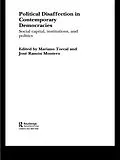Citizens of many democracies are becoming more critical of basic political institutions and detached and disaffected from politics in general.
This is a new comparative analysis of this trend that focuses on major democracies throughout Latin America, Asia and Central Europe. It brings together leading scholars to address three key areas of the current debate:
- the conceptual discussion surrounding political disaffection
- the factors causing voters to turn away from politics
- the actual consequences for democracy
This is a highly relevant topic as representative democracies are coming to face new developments. It deals with the reasons and consequences of the so called 'democratic deficit' in a systematic way that enables the reader to develop a well-rounded sense of the area and its main debates.
This book is an invaluable resource for all students of political science, sociology, cultural studies and comparative politics.
Autorentext
Mariano Torcal, José Ramón Montero
Inhalt
Part 1. Introduction 1. Political Disaffection in Comparative Perspective Part 2. Concepts and Dimensions 2. Democracy, Disaffection and Institutions: Some Neo-Tocquevillean Speculations 3. The Multidimensionality of Political Support for New Democracies: Conceptual Redefinition and Empirical Refinement Part 3. Causes I: Institutional Disaffection and Social Capital4. Institutional Confidence and Social Trust: Aggregate and Individual Relations 5. Democracy and Involvement: The Benevolent Aspects of Social Participation 6. Understanding the Relationship between Social Capital and Political Disaffection in the New Post-Communist Democracies Part 4. Causes II: Politics and Institutions 7. Political Disaffection and Democratization History in New Democracies 8. Confidence in Parliaments: Performance, Representation and Accountability 9. Political Disaffection and Political Performance: Norway 1957-2001 10. Italy, Forty Years of Political Disaffection: A Longitudinal Exploration Part 5. Consequences: Participation, Protest, and Information 11. Does protest Signify Disaffection? Demonstrators in a Postindustrial Democracy 12. Political Participation, Information and Accountability: Some Consequences of Political Disaffection in New Democracies Part 5. Conclusions13. Some Basic Conclusions About Political Disaffection in Contemporary Representatives Democracies
